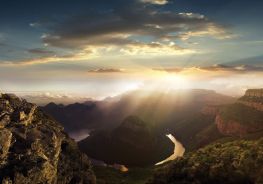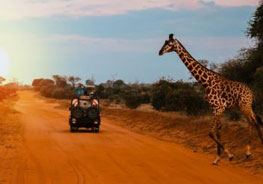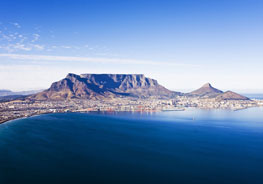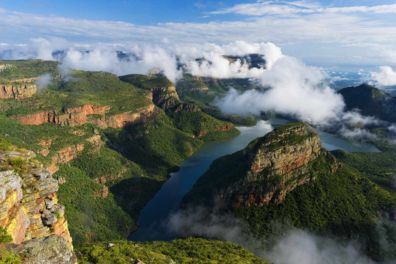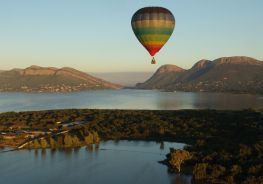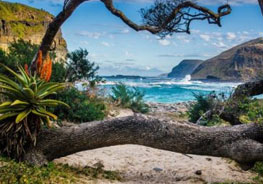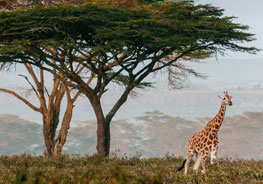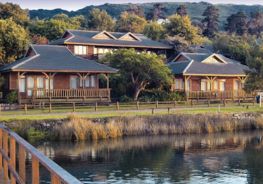Call Us
8:00am - 17:00PM
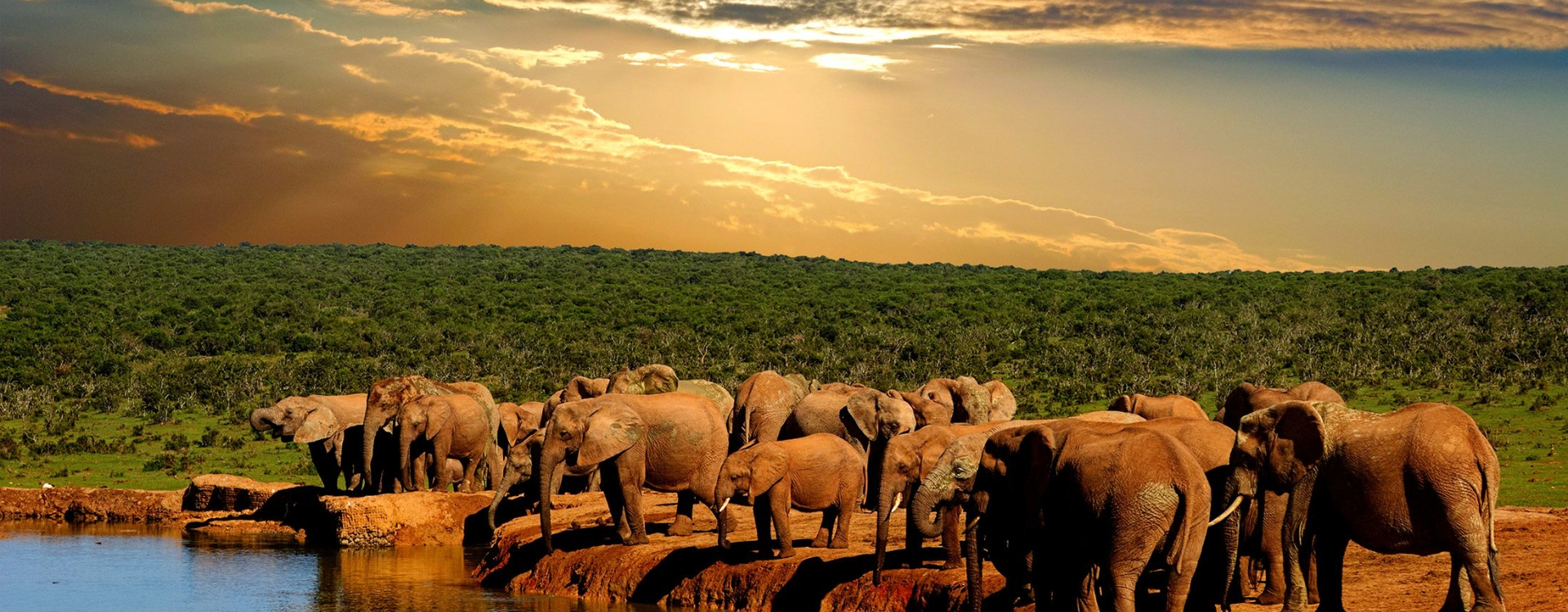
South Africa Wildlife
South Africa
Wildlife
Few other places on our planet offer experiences like diving on a coral reef to start the day and heading out on a big five safari in the evenings, as South Africa Safari does. And if you’re on the lookout for wildlife then we’re dead sure that the possibilities are limitless. South Africa Wildlife has it all!
From aquatic species like penguins, whales, and sharks, to the classic safari animals, the feeling that wildlife enthusiasts get here is outright amazing. Below we’ll have an in-depth look-through at some of the most renowned South Africa Wildlife species, destinations, activities, etc. So strap yourselves in for an adventure that may involve hanging out with penguins or catching the sight of elusive animals that few get the chance to see!
South Africa Wildlife Highlights
Best South African Wildlife Destinations
Best Ways to See the Wildlife of South Africa
South Africa Wildlife Safari Packages
Wildlife Conservation in South Africa
National Animal and Bird of South Africa
Rare South African Wildlife Species
Best Time to see South African Wildlife
Interesting Facts about South African Wildlife
South Africa Wildlife Highlights
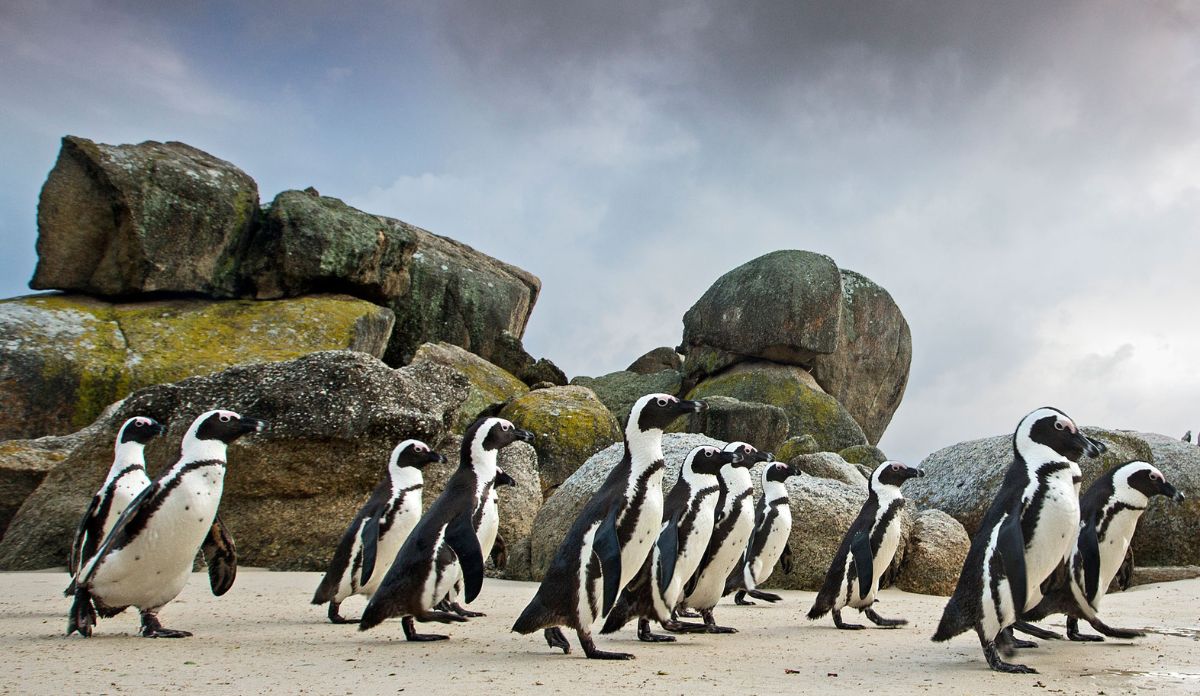
The varied landscapes of South Africa Tour ranging from dense forests to arid deserts support thousands of animals and several different species of birds. These include everything from aquatic animals to the African big five. Below are some wildlife highlights of South Africa:
The elusive Leopards!
Best Place to see them - The Sabi Sands Game Reserve, Bordering Kruger National Park
Leopards in the reserve are completely used to the environment and are unbothered by the presence of safari vehicles, making South Africa Safari Tours here optimal. Outside the private reserve in the southern Kruger National Park, there are also potential chances of seeing them out and about.
The waddling Penguins!
Best Place to see them - Boulders Beach, Cape Town
Just past Simon’s Town, on the edge of False Bay, there’s a penguin colony at Boulders Beach. These colonies are protected as part of a collaboration project between the city of Cape Town and South African National Parks (SANParks).
- A visit to the Boulders visitors’ centre will allow you to learn more about these happy-go-lucky creatures.
- You will get plenty of chances to spot them on the surrounding beaches and may even swim with them (though mind you, the waters can be very chilly).
The sleek and playful dolphins!
Best Place to see them - Sodwana Bay, Kwa-Zulu Natal
Near the Mozambique border in northern Kwa-Zulu Natal is one of the best diving destinations for South Africa Tours.
- Aquatic wildlife enthusiasts will also get their share of fun because this is also a wonderful place to see dolphins.
- Boats often stop en route to a dive site where you can spot dolphins and even jump in the water with a snorkel and a mask.
The mighty great white!
Best Place to see them - Gansbaai
Gansbaai is just a two-hour drive from Cape Town and this small coastal town has made a name for itself through South African Tour activities like whale watching and cage diving.
- Though the most renowned activity here has to be seeing the great white sharks.
- Boat operators use cages that are attached to the side of the vessels and you can slip into this and watch white sharks passing by.
The royals of the Bush!
Best Place to see them - Kruger National Park
You can see lions in reserves and national parks all over South Africa, though the standout amongst them is undoubtedly Kruger National Park. The park is home to more than 1,500 lions, and the best areas to see them are the northern and central sections.
A Personalized Suggestion – During the day, lions tend to be less active, they are seen mostly taking a nap. So, head out on your South Africa Safari at dawn or dusk so that you can see lions when they are most likely to be hunting.
Gigantic aquatic giants!
From June to November, southern right whales make their way to the southwestern coastline of South Africa to breed. They come so close to the shore that it’s even possible to see them sunbathing on the surface.
Best Place to see them - Hermanus
Interesting Fact – When you visit Hermanus on your South Africa Trip, you’ll likely spot whale criers. They alert people of whale sightings by blowing a kelp horn.
The gentle giants!
South Africa Wildlife Safari has another surprise in store, i.e. seeing one of the densest population elephants on the whole African continent.
Best Place to see them - Addo Elephant National Park
You can head out to a watering hole (you won’t find them hard to locate, they’re spread evenly throughout the park) and witness huge herds of elephants.
Trip Suggestions - You can easily combine this wildlife affair with other destinations like Port Elizabeth and even a Garden Route day/road trip.
The intimidating Rhinos!
Two kinds of rhinoceros inhabit the surroundings of South Africa – white and black rhinos.
- White rhinos are relatively easier to spot, they often can be seen in groups and grazing on the grasses of the savannahs.
- Whereas, black rhinos are more elusive and prefer to live in solidarity.
Best Place to see them - Madikwe Game Reserve, North West province of South Africa
Scaly Pangolins!
Pangolins are one of the most unique mammals that you’ll get to see on your South Africa Wildlife Tours.
Best Place to see them - Phinda Private Reserve, KwaZulu-Natal
- A reintroduction programme that was set up for the conservation of these animals has gone a long way to support their population.
- You can also join the research and rescue team on their evening patrols, and this will help greatly to fund the conservation project as well.
Best South African Wildlife Destinations
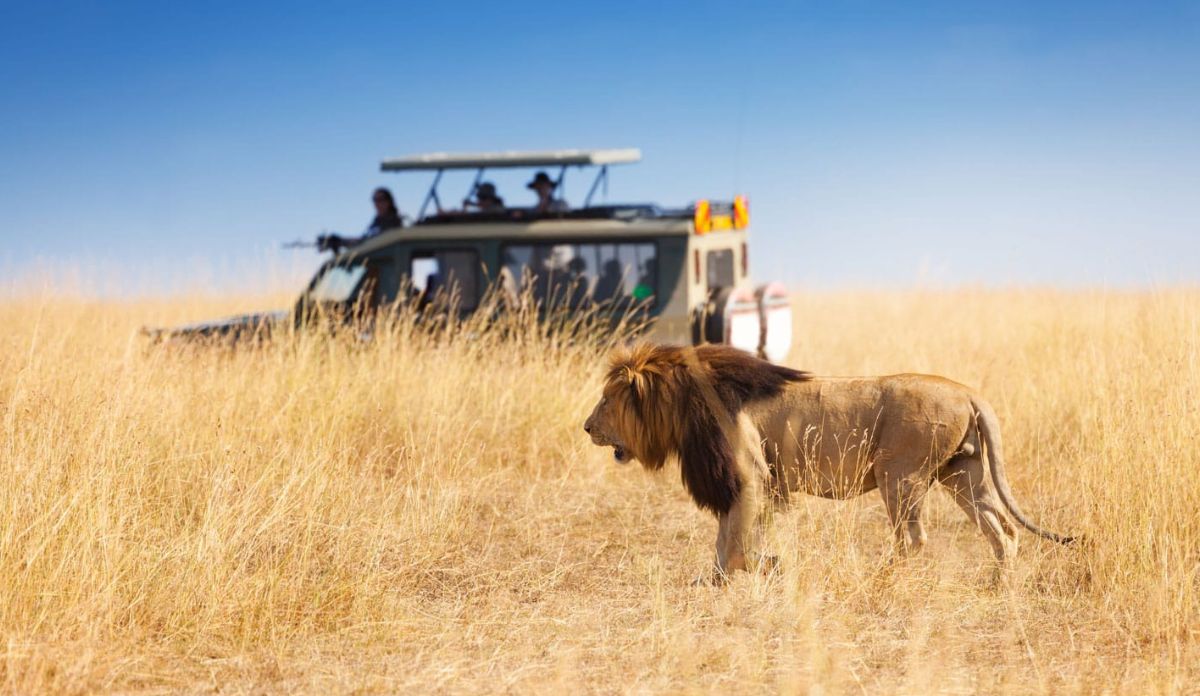
South Africa is a nature lover’s paradise with a wide variety of wildlife destinations that offer rich South Africa Safari experiences. The country is home to many of the world’s most iconic species such as lions, elephants, rhinos, and more.
Here are some of the best South African wildlife destinations that every traveller should consider including in their South Africa Safari Packages:
Kruger National Park
Kruger National Park is one of Africa’s largest game reserves, covering an area of 19,485 square kilometres. The park is home to over 500 bird species and more than 140 different mammals, including the Big Five (lions, elephants, leopards, buffalos, and rhinos). Here’s a quick look at the park:
|
ATTRIBUTES |
DETAILS |
|---|---|
|
Location |
Mpumalanga and Limpopo provinces |
|
Main Activities |
Game drives, bush walks, bird watching, and camping |
|
Best time to visit |
May to September |
|
Accommodation |
Various lodges and campsites |
Kgalagadi Transfrontier Park
Kgalagadi Transfrontier Park is located in the Kalahari Desert and is known for its red dunes and diverse wildlife. The park is home to over 200 species of birds and 80 different mammals, including the renowned black-maned Kalahari lions.
|
ATTRIBUTES |
DETAILS |
|---|---|
|
Location |
Northern Cape |
|
Main Activities |
Game drives, bird watching, and camping |
|
Best time to visit |
April to September |
|
Accommodation |
Various lodges and campsites |
Hluhluwe-Imfolozi Game Reserve
This South African game reserve is located in the heart of Zululand and is the oldest game reserve in Africa. The area of the reserve is a habitat for over 300 bird species and the Big Five, as well as the elusive cheetah. Here’s a quick look-see at the reserve:
|
ATTRIBUTES |
DETAILS |
|---|---|
|
Location |
KwaZulu-Natal |
|
Main Activities |
Game drives, bird watching, and camping |
|
Best time to visit |
May to September |
|
Accommodation |
Various lodges and campsites |
Addo Elephant National Park
Addo Elephant National Park is located in the Eastern Cape and is known for its large herds of elephants. The park is also home to the Big Five and a variety of other animals, such as zebras and hyenas.
Here’s a quick look at the different experiences that the park offers for visitors who are on a South Africa Safari.
|
ATTRIBUTES |
DETAILS |
|---|---|
|
Location |
Eastern Cape |
|
Main Activities |
Game drives, bird watching, and camping |
|
Best time to visit |
April to September |
|
Accommodation |
Various lodges and campsites |
Sabi Sands Game Reserve
Sabi Sands Game Reserve is located adjacent to Kruger National Park and is known for its luxurious lodges and high concentration of leopards. The reserve is home to over 300 bird species and the Big Five.
|
ATTRIBUTES |
DETAILS |
|---|---|
|
Location |
Mpumalanga and Limpopo provinces |
|
Main Activities |
Game drives, bird watching, and photography |
|
Best time to visit |
May to September |
|
Accommodation |
Various luxurious lodges |
Best Ways to See the Wildlife of South Africa
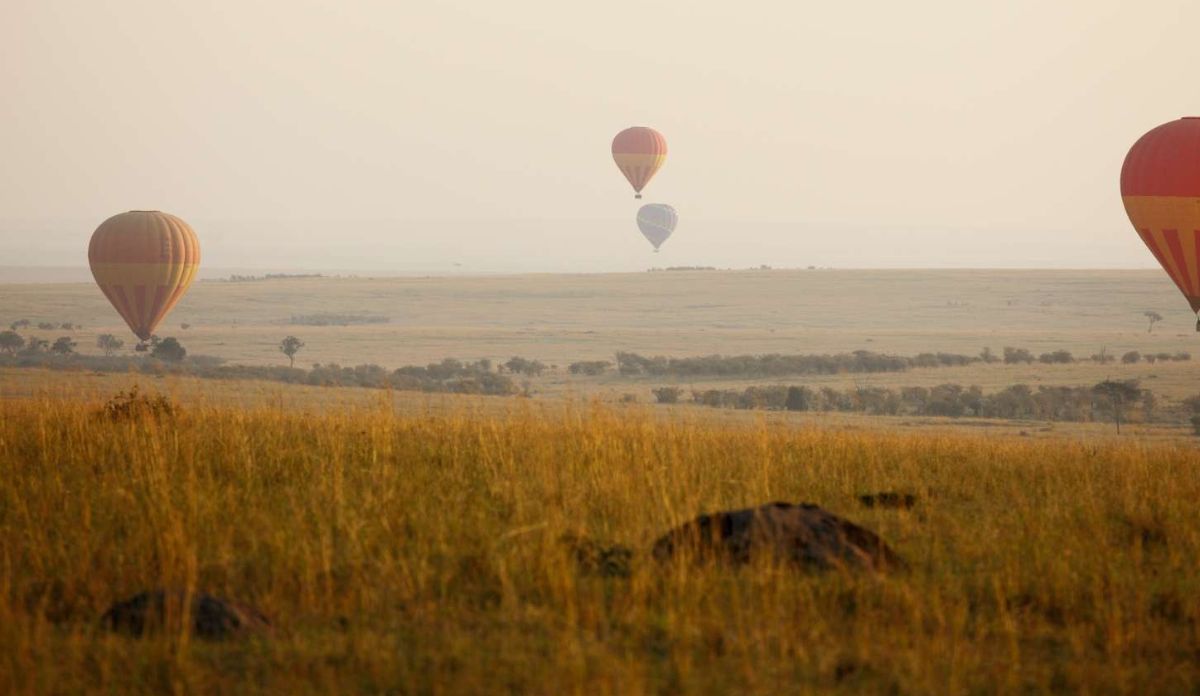
South Africa is known for its incredible wildlife and offers visitors a variety of ways to experience it. From traditional game drives to walking safaris and even hot air balloon rides, there are many ways to get up close and personal with the country's iconic wildlife.
Let's get a load of some of the best ways to see South Africa Wildlife and the animals you're likely to encounter on each safari activity.
Game Drives
Game drives are the most popular way to experience South Africa Wildlife. Visitors can choose from open-air vehicles, closed vehicles, or even guided walks to see the animals.
Game drives offer a chance to see the Big Five (lion, leopard, elephant, rhino, and buffalo) as well as other animals such as giraffes, zebras, and antelopes. Here are some of the animals you're likely to see on a game drive:
|
ANIMALS |
HABITAT |
DIET |
|---|---|---|
|
Lion |
Savannah |
Carnivore |
|
Leopard |
Forest and Savannah |
Carnivore |
|
Elephant |
Forest and Savannah |
Herbivore |
|
Rhino |
Grasslands and Savannah |
Herbivore |
|
Buffalo |
Grasslands and Savannah |
Herbivore |
|
Giraffe |
Savannah |
Herbivore |
|
Zebra |
Grasslands and Savannah |
Herbivore |
|
Antelope (various species) |
Grasslands and Savannah |
Herbivore |
Walking Safaris
Walking safaris offer a more intimate and up-close experience with South Africa Wildlife. Visitors can walk with an experienced guide and get a closer look at animals and their habitats.
Walking safaris offer a chance to see animals such as elephants, rhinos, and buffalo, as well as smaller animals like bushbabies and chameleons. Here are some of the animals you're likely to see on a guided South Africa Safari Tours on foot:
|
ANIMAL(S) |
HABITAT |
DIET |
|---|---|---|
|
Elephant |
Forest and Savannah |
Herbivore |
|
Rhino |
Grasslands and Savannah |
Herbivore |
|
Buffalo |
Grasslands and Savannah |
Herbivore |
|
Bushbaby h4 |
Forest |
Omnivore |
|
Chameleon |
Forest and Savannah |
Insects |
Hot Air Balloon Rides
Hot air balloon rides offer a unique and breathtaking view of South Africa's wildlife. Visitors can soar over the savannah and see animals from a bird's-eye view.
Hot air balloon rides offer a chance to see animals such as elephants, giraffes, and antelopes from a different perspective. The following are some South Africa Wildlife you'll get the chance to see on a hot-air balloon ride:
|
ANIMAL(S) |
HABITAT |
DIET |
|---|---|---|
|
Elephant |
Forest and Savannah |
Herbivore |
|
Giraffe |
Savannah |
Herbivore |
|
Antelope (various species) |
Grasslands and Savannah |
Herbivore |
South Africa Wildlife Safari Packages
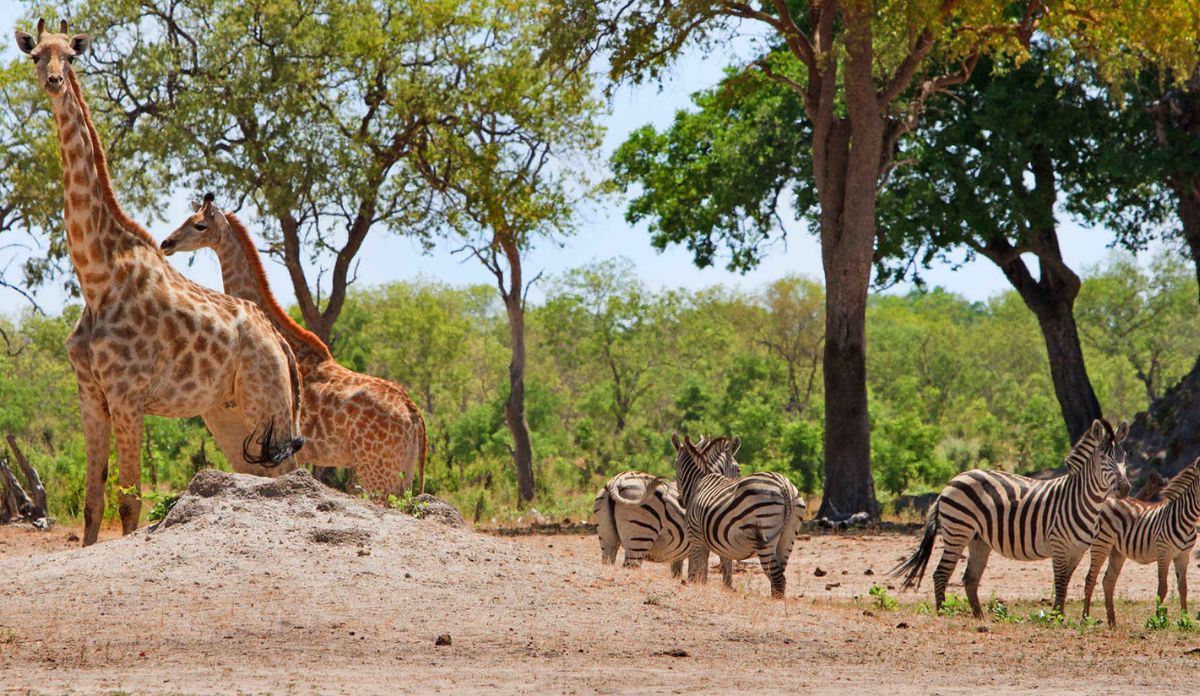
If you’re planning on seeing the natural wildlife wonders on your safari in the diverse surroundings of South Africa, then we have some amazing news. Here are some of our specialized recommendations for South Africa Safari Packages that will take you right to the centre of the wildlife action.
|
NAME OF THE PACKAGE(S) |
DESTINATIONS COVERED |
WILDLIFE VIEWING EXPERIENCE |
|---|---|---|
|
8 Days Big Five Encounter |
Kruger National Park: Malelane and Mjejane Game Reserve, Sabie River Valley |
Guided game drives to spot the big five Scenic photographic tours Elephant tracking and Microlight Safaris |
|
5 Days Bush Country Getaway |
Kruger National Park White River |
Guided 4WD Safaris Birdwatching tours Elephant back safaris |
|
5 Days 4 Nights The Greater Kruger Adventure |
Kruger National Park |
Guided nature walks Elephant back safaris River cruises to see aquatic wildlife species |
Wildlife Conservation in South Africa
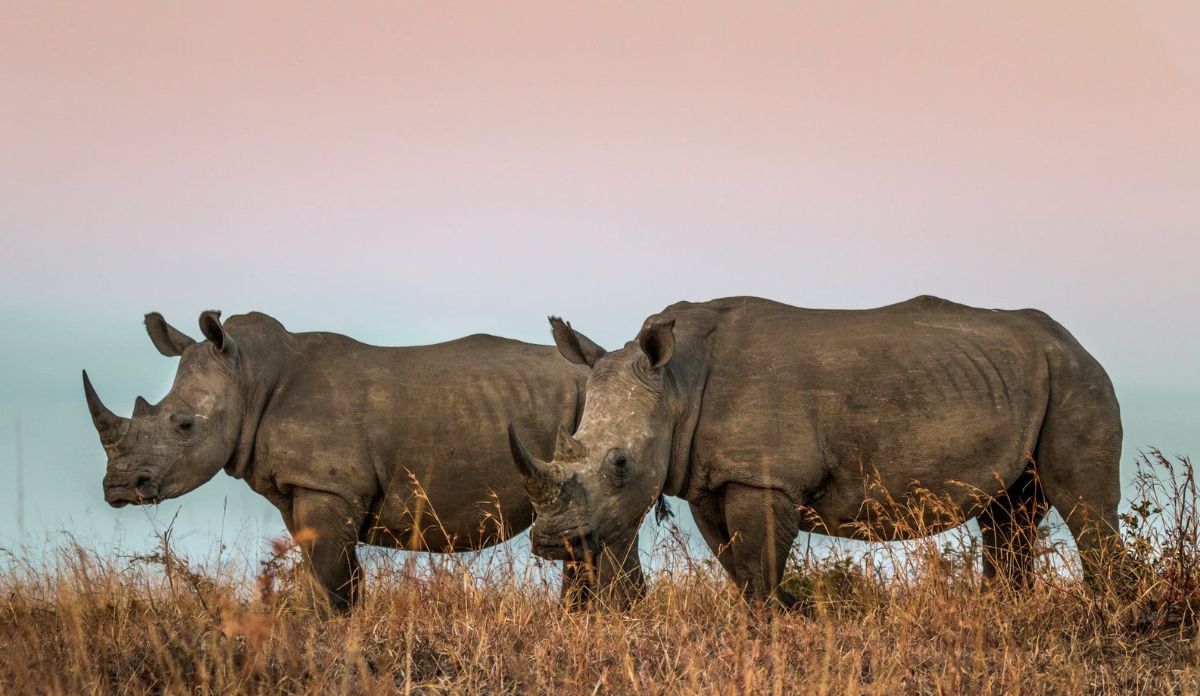
To ensure that the precious South Africa Wildlife remains protected for generations to come, the country has implemented various wildlife conservation efforts.
- Wildlife conservation in South Africa is governed by the Department of Environment, Forestry, and Fisheries (DEFF).
- They are responsible for ensuring that wildlife is protected and managed sustainably.
- The DEFF works closely with various conservation organizations such as the Endangered Wildlife Trust, the Wildlife and Environment Society of South Africa, and the South African National Biodiversity Institute to implement various conservation efforts.
- One of the most significant conservation efforts in South Africa is the establishment of national parks and reserves.
These protected areas provide a haven for wildlife and their habitats, while also attracting tourism and generating income for the local communities. Below are some of the most popular national parks in South Africa and their wildlife highlights:
|
NATIONAL PARK |
LOCATION |
SIZE |
KEY WILDLIFE |
|---|---|---|---|
|
Kruger National Park |
Limpopo and Mpumalanga provinces |
19,485 square km |
Lions, elephants, rhinos, leopards, buffalo |
|
Addo Elephant National Park |
Eastern Cape |
1,640 square km |
Elephants, lions, buffalo, rhinos |
|
Hluhluwe-iMfolozi Park |
KwaZulu-Natal |
960 square km |
Rhinos, elephants, lions, leopards, buffalo |
|
Table Mountain National Park |
Western Cape |
221 square km |
Baboons, penguins, caracals, hyrax |
In addition to national parks, there are also numerous private game reserves in South Africa.
- These reserves are owned and managed by private individuals or companies and often offer a more exclusive and luxurious South Africa Safari Trip.
- And they also play a vital role in conservation, as they often have more resources to devote to anti-poaching efforts and habitat restoration.
- Finally, community-based conservation is also an essential part of wildlife conservation in South Africa.
- Many of the communities that live near protected areas rely on natural resources for their livelihoods, and as such, it is crucial to involve them in conservation efforts.
This can include initiatives such as eco-tourism, sustainable resource use, and education programs to raise awareness about the importance of conservation.
National Animal and Bird of South Africa
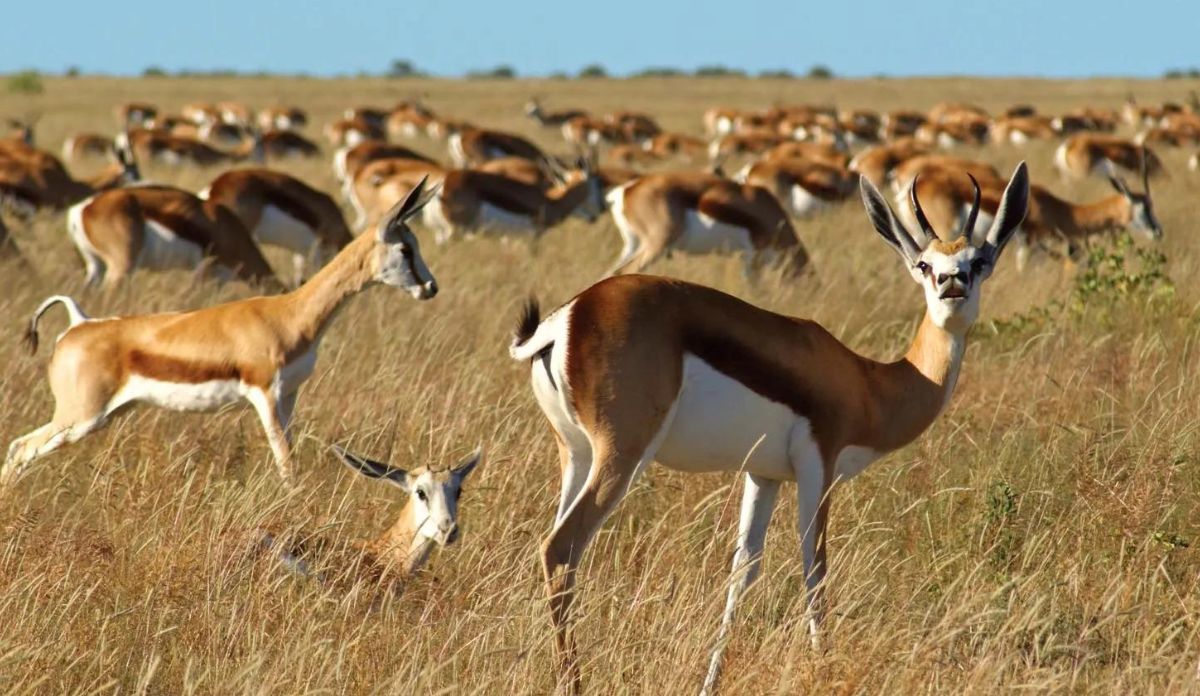
South Africa has several national symbols that represent its unique cultural and natural heritage. The national animal of South Africa is the Springbok, while the national bird is the Blue Crane.
- The Springbok is a small antelope that is found throughout the country's grasslands and savannas.
- It is known for its unique jumping, which can reach heights of up to 3 meters.
- The Springbok has been a symbol of South Africa since the 19th century, and it is often associated with the country's sporting teams.
- The Blue Crane is a large, elegant bird that is found in wetland areas throughout South Africa.
- It is known for its distinctive blue-grey plumage and its elaborate courtship displays.
- The Blue Crane was declared the national bird of South Africa in 1968 and is a symbol of the country's natural beauty and biodiversity.
Both the Springbok and the Blue Crane are important national symbols that represent South Africa's unique cultural and natural heritage. They are a reminder of the country's rich history and diverse wildlife, and they serve as a source of pride for all South Africans.
Rare South African Wildlife Species
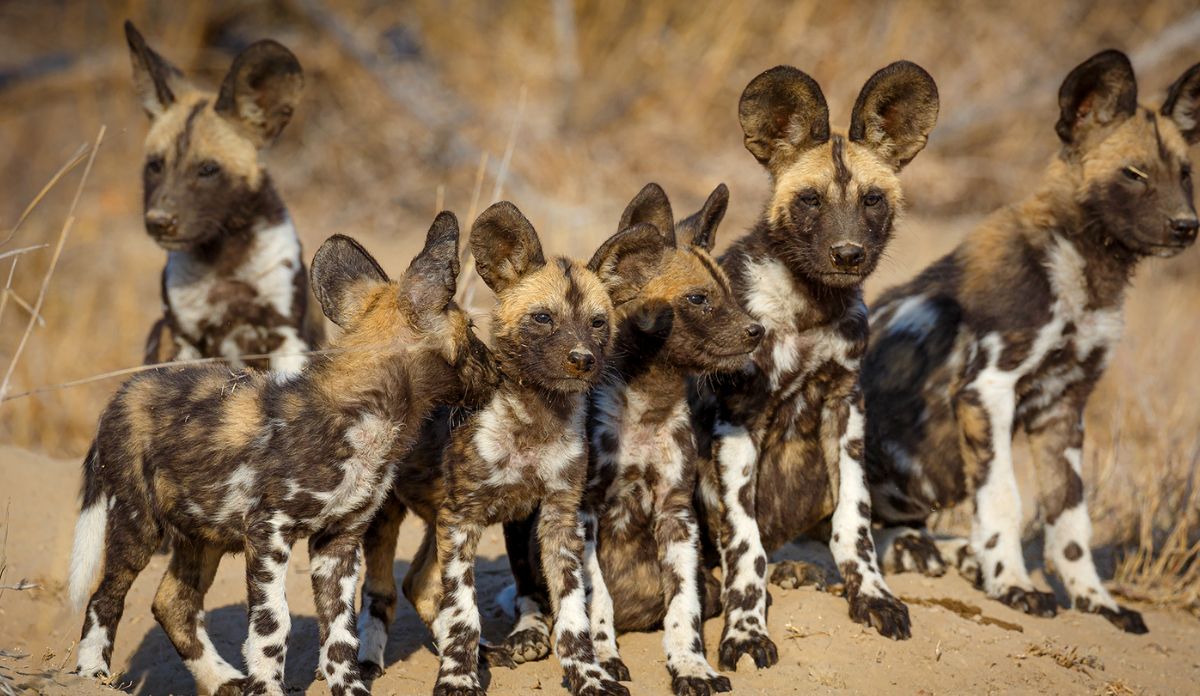
South Africa is home to an incredibly diverse range of wildlife, including many rare and endangered species. These animals are under threat from habitat loss, poaching, and other human activities.
To ensure that these species are protected, various conservation organizations are working to safeguard their populations and habitats. Here are some of the rare South Africa Wildlife species that are being protected:
|
SPECIES |
SCIENTIFIC NAME |
POPULATION |
|---|---|---|
|
Black Rhino |
Diceros bicornis |
< 5,500 |
|
African Wild Dog |
Lycaon pictus |
< 6,000 |
|
Cape Vulture |
Gyps coprotheres |
< 4,000 |
|
Riverine Rabbit |
Bunolagus monticularis |
< 250 |
Endangered rhinos!
The Black Rhino is one of the most endangered species in South Africa. Poaching for their horns has decimated their populations, and they are now classified as critically endangered.
IUCN Red List status: Critically Endangered
Major threats: Poaching for their horns, habitat loss
Current Conservation Efforts: Conservation organizations are working hard to protect them, with anti-poaching patrols, habitat restoration, and translocation programs.
Fierce wild predators!
The African Wild Dog is another rare species that is under threat. These highly social animals are endangered due to the loss of their habitats.
IUCN Red List status: Endangered
Major threats: Habitat loss, persecution by humans
Current Conservation Efforts: Conservation organizations are working to protect them through anti-poaching efforts, habitat restoration, and community outreach programs.
High-flying scavengers!
The Cape Vulture is a large bird of prey that is found only in southern Africa.
IUCN Red List status: Endangered
Major threats: Habitat loss, electrocution on power lines, poisoning from eating carcasses that have been laced with poison.
Current Conservation Efforts – Conservation organizations are working to protect them through habitat restoration, monitoring, and education programs.
An adorable creature of the night!
Riverine Rabbit is one of the rarest mammals in the world. They are found only in the Karoo region of South Africa and are threatened by habitat loss.
IUCN RED List status: Critically Endangered
Major threats: Habitat loss, predation by domestic animals, climate change
Current Conservation Efforts: Conservation organizations are working to protect them through habitat restoration, captive breeding, and community engagement.
Protecting these rare South African wildlife species is critical to preserving the country's unique biodiversity and natural heritage. Through conservation efforts, we can ensure that these animals continue to flourish for generations to come.
Best Time to see South African Wildlife
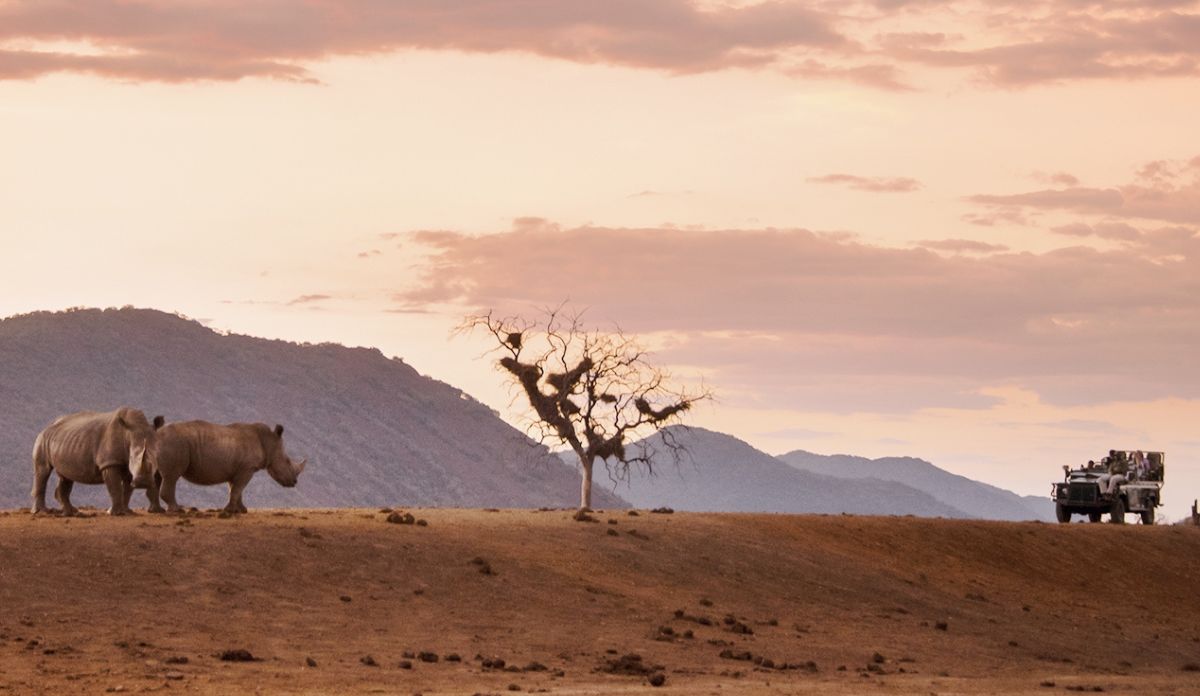
South Africa is a wildlife lover's paradise, with a wide variety of animals and birds that can be seen throughout the year.
However, the Best Time to Visit South Africa for wildlife viewing can vary depending on the species and the region. Here's a guide to the best time to see some of South Africa's most iconic wildlife:
|
WILDLIFE |
BEST TIME TO SEE |
REGION |
|---|---|---|
|
Whales |
June to November |
Western Cape and KwaZulu-Natal |
|
Penguins |
Year-round |
Western Cape |
|
Lions |
May to September |
Kruger National Park |
|
Elephants |
June to September |
Kruger National Park and Addo Elephant National Park |
|
Rhinos |
June to September |
Kruger National Park |
Note – While these are some of the best times and regions to see South Africa's wildlife, it's important to note that wildlife sightings can never be guaranteed. However, by visiting during these times and in these regions, you'll increase your chances of seeing some of the country's most iconic creatures in their natural habitats.
Interesting Facts about South African Wildlife
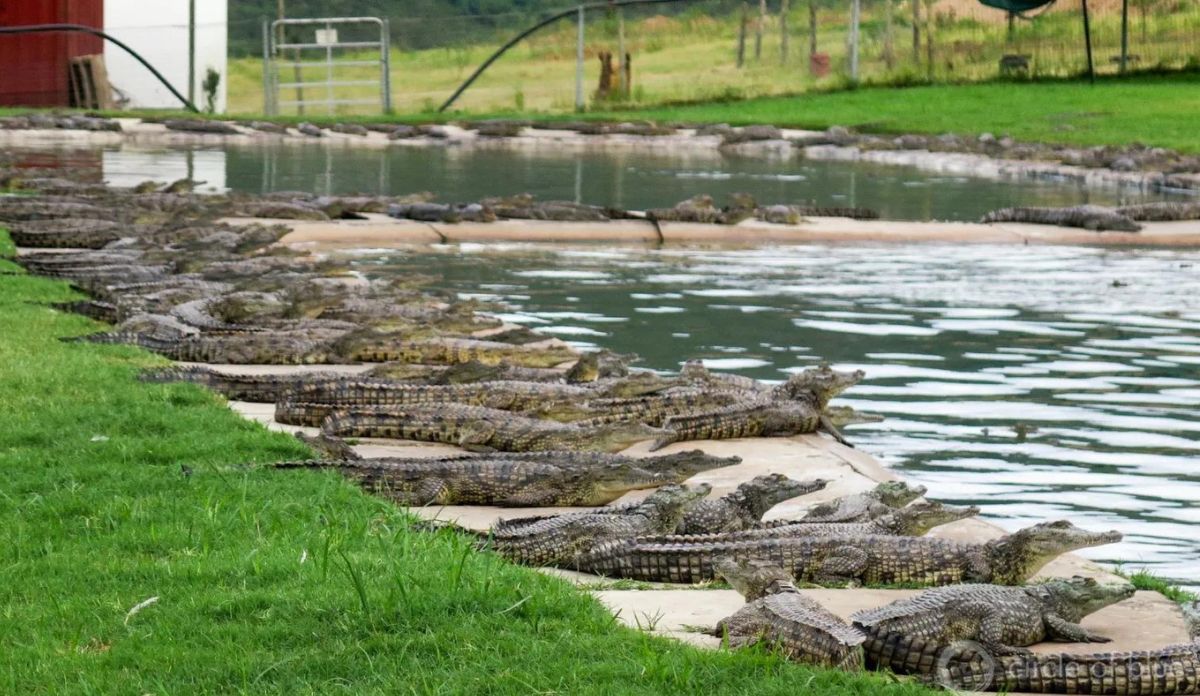
The varied landscapes of South Africa help to support a tremendous concentration of wildlife. Below are some fascinating facts about South Africa Wildlife:
- South Africa is home to the "Big Five" game animals: lions, leopards, rhinos, elephants, and buffalo.
- The African elephant is the largest land animal in the world, and South Africa is home to two distinct species: the African savannah elephant and the African forest elephant.
- The African wild dog is one of the most endangered species in Africa, with only about 5,500 remaining in the wild.
- The black mamba, found in southern and eastern Africa, is one of the world's deadliest snakes, capable of delivering a lethal bite.
- The Kruger National Park is one of the largest game reserves in Africa and home to a wide variety of wildlife, including over 500 bird species.
- The Nile crocodile is found throughout sub-Saharan Africa and is known for being one of the largest crocodile species in the world, capable of growing up to 20 feet long.
- The African penguin is found only along the southwestern coast of Africa and is endangered due to habitat loss and overfishing.
- The leopard is one of the most elusive of the "Big Five" animals, known for its stealth and ability to blend in with its surroundings.
- South Africa is home to over 1,100 species of reptiles, including the iconic chameleon, which is known for its ability to change colour to blend in with its environment.
Initiate exploration of South Africa’s astounding array of wildlife!
We won’t take up much of your time any longer because we’ve practically gone over everything that you need to know about South Africa Wildlife. And, we have covered aspects that few have pondered to write about (for example the conservation efforts and community-based wildlife ecotourism) because we feel the marvellous South Africa Wildlife deserves special treatment.
One thing remains, book a South Africa Safari Packages from the ones we’ve mentioned above or simply check out this link - https://falconsafaris.com/african-safaris
South Africa
Wildlife
South Africa Wildlife Highlights
Best South African Wildlife Destinations
Best Ways to See the Wildlife of South Africa
South Africa Wildlife Safari Packages
Wildlife Conservation in South Africa
National Animal and Bird of South Africa
Rare South African Wildlife Species
Best Time to see South African Wildlife
Interesting Facts about South African Wildlife
Related South Africa Travel Guide
We Think You’ll Love
Frequently Asked Questions
We Think You’ll Love
The Big Five refers to the five most sought-after South Africa Wildlife, which are the African elephant, lion, leopard, rhinoceros, and Cape buffalo.
Some of the best wildlife reserves in South Africa include Kruger National Park, Sabi Sands Game Reserve, Addo Elephant National Park, and Hluhluwe-iMfolozi Park. .
The dry winter months from May to September are generally considered the Best Time To See Wildlife In South Africa, as animals are drawn to water sources and vegetation is sparse.
Responsible tourism involves making choices that have a positive impact on the environment, wildlife, and local communities. This includes supporting conservation efforts, minimizing environmental impact, and respecting wildlife.
It is important to follow park rules and regulations, stay in designated viewing areas, and maintain a safe distance from animals. It is also recommended to travel with a knowledgeable guide or ranger.
National parks are typically government-run protected areas that are open to the public for conservation and recreation purposes. Game reserves are typically privately owned and managed, and may focus more on providing exclusive wildlife experiences.
South Africa is home to a wide range of wildlife, including lions, leopards, elephants, rhinoceros, Cape buffalo, giraffes, zebras, hippos, and numerous species of antelope, as well as many bird species.
Poaching is the illegal hunting or killing of wildlife, and it has a significant impact on South Africa's wildlife populations, particularly rhinoceros and elephants. Poaching threatens the survival of these species and undermines conservation efforts.
Yes, many organizations and programs offer opportunities to volunteer and support wildlife conservation efforts in South Africa.
Wildlife conservation is important for preserving South Africa's unique biodiversity, supporting ecological balance and sustainability, and protecting the cultural heritage of local communities.
Ecotourism can provide a sustainable source of income for local communities and support conservation efforts through funding and education.
Climate change can impact wildlife and their habitats through changes in temperature, precipitation, and weather patterns. This can affect animal behaviour, breeding patterns, and migration routes, and threaten the survival of some species.
We are thrilled to help you plan your perfect safari holiday
We'd be delighted to help you with any questions you have about properties & safaris. Please fill in the form below so that we can help you create your perfect safari holiday.
Or
Contact Us
Feel free to give us a call or send us an e-mail:
Start Planning Your Tailored African Safari

Expert Safari Knowledge
With decades of expertise, we're your trusted safari guides, ensuring every moment exceeds your expectations.

Tailor-made African Safaris
Tailored to your preferences, our African Safaris guarantee an adventure perfectly suited to your desires.

Long-term Relationships
Our enduring partnerships across Africa provide exclusive access and authentic experiences.

Carefree Travel
Leave your worries behind and accept carefree travel with Falcon Safaris, where every detail is handled to perfection.
Our Travelers Say

We travelled with Falcon Safaris in Zimbabwe and Botswana for 16 days. Falcon designed a wonderful trip with private guide to the most interesting sites in both countries. The organization of the whole trip was excellent, flights within the country, accommodation and activites. The guides were very knowledgable and told us a lot about the countries, their history, people, economy and much more. We visited the Great Zimbabwe Ruins, the Victoria Falls Tour and a number of national parks in both countries.
Rhino tracking was a real adventure! We had tremendous further game drives and saw very many animals - we did the Big Five. We had much more Victoria Falls Activities than planned and enjoyed very much.We strongly recommend Falcon Safaris to everyone planning a trip to Southern Africa and East Africa.
Wonderful trip to Zimbabwe and Botswana with excellent organization and very competent guides

Our Consultant Vimbai was very helpful and accommodating. We stayed at the Elephant hills hotel which was nothing short of amazing.Our activities included a helicopter flight, dinner cruise as well as a morning game drive. All the activities were absolutely amazing.
Exceptional!

We worked with Gertrude to schedule and organize everything and she did an excellent job. I asked a lot of questions via e-mail and she answered everyone in a timely helpful manner. Our guide at Victoria Falls was also great. He met us at the airport, provided a thoughtful tour of the Falls and got us to our next guide in Botswana. Our lodgings at River View Lodge were just as described- very comfortable and excellent food. All the staff were so pleasant and helpful. If I had to do it again I would arrange a morning boat ride as well. We only did the sunset boat rides and they were the high point of our entire trip- we saw so many animals and our guide was very knowledgeable. Just a great experience. Our lodgings at Oddball's Enclave was rustic and we loved it. So great to disconnect from the world for a bit. Leo, our guide, was the best - got us out and about, saw fantastic wildlife and got back to camp safely each time. Doc manages the camp so well. This whole trip was planned and organized by Falcon Safaris and we could not have been happier.
Fabulous, well planned trip

Falcon safaris have given my the correct advice with excellent service. The only suggestion will be to work closer with the lodges to confirm bookings as soon as possible. We have booked and pay our deposit a year in advance. We have only receive our final convermation from Chobe Safari lodge a week before departure. I do realize its not within your controle but with limit alternatives and a group of 14 people it becomes an issue to find alternative accomodation if the booking was cancelled.
Excellent and efficient service
Explore Our Africa With Customize Your Tour
We love Africa's diversity and create amazing trips for you. With 30+ years of experience, we customize every trip just for you.

